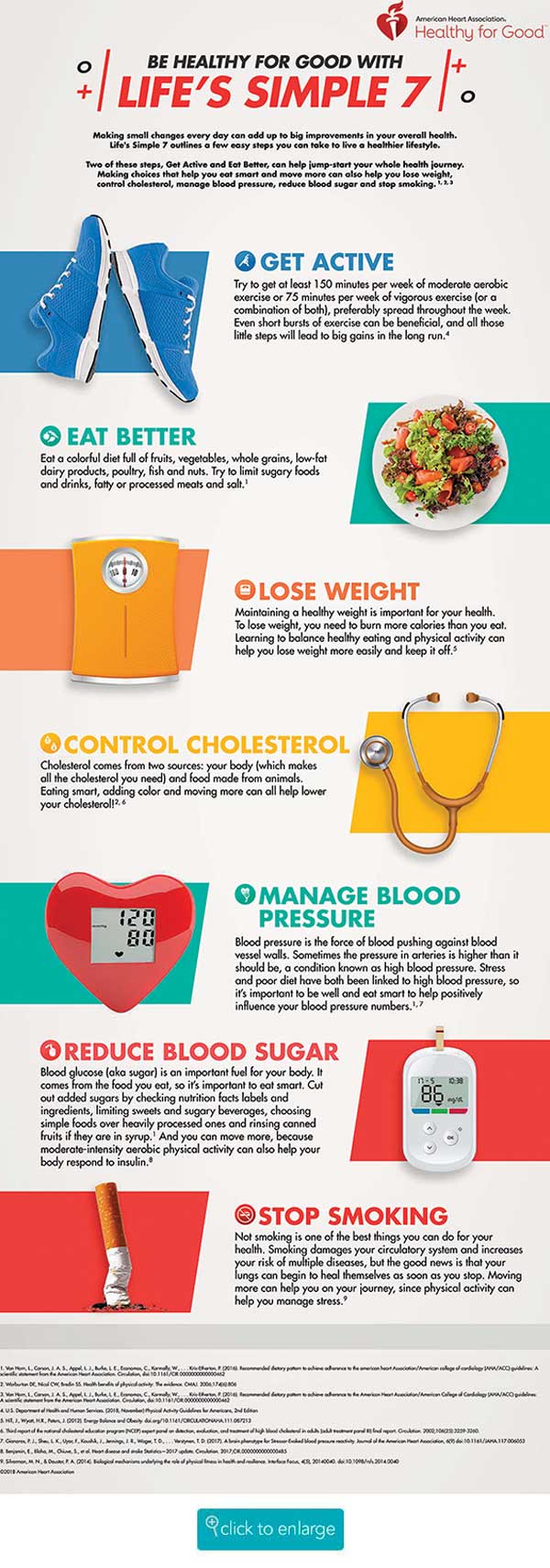How To Reclaim Your Health
Cholesterol – a waxy substance created by the liver or consumed from meat, poultry and dairy products – isn’t inherently “bad” for you. In fact, your body needs it to build cells and make vitamins and other hormones. However, too much “bad” LDL cholesterol, or not enough “good” HDL cholesterol, can pose problems.
High cholesterol is one of the major controllable risk factors for heart disease and stroke. Because it typically has no symptoms, you may not know you have high cholesterol until it’s already causing problems.
Knowing key health numbers like your blood sugar, blood pressure and cholesterol, and working closely with your doctor to manage them, are keys to preventing heart disease and stroke.
Those who have already experienced a heart attack or stroke or have family history of cardiovascular disease, chronic inflammatory disease or kidney disease may need to have their cholesterol and other risk factors checked more often and may need medication to manage their conditions to prevent another event. According to the American Heart Association, as many as 1 in 4 survivors will have another heart attack or stroke.
Some lifestyle habits can help manage your risk and help you live a longer, healthier life like watching what you eat, getting more exercise and managing stress.

 Make Healthy Menu Choices
Make Healthy Menu Choices
A healthy eating plan is a well-rounded diet with plenty of fruits and vegetables (at least 4-5 servings each day). In fact, researchers at the University of Columbia found each daily serving of fruits or vegetables was associated with a 4% lower risk of coronary heart disease and a 5% lower risk of stroke.
Other smart choices for your menu include nuts and seeds, whole grains, lean proteins and fish. Limit sweets, sugar-sweetened beverages, saturated fat, trans fat, sodium and fatty or processed meats.
Get Moving
You likely know exercise is good for you, but an Oxford University study revealed simply swapping 30 minutes of sitting with low-intensity physical activity can reduce your risk of death by 17%. Mortality aside, in its Physical Activity Guidelines for Americans, the U.S. Department of Health and Human Services noted physical activity offers numerous benefits to improve health, including a lower risk of diseases, stronger bones and muscles, improved mental health and cognitive function and lower risk of depression.
The greatest impacts come from getting the recommended amount of activity: at least 150 minutes of moderate activity, 75 minutes of vigorous activity or a combination of those activities per week. Be sure to discuss with your doctor which activities may be best for you.
If you’re having trouble getting motivated, small steps like walking your dog can lead to big changes over time. A scientific statement from the American Heart Association on pets and heart-health showed dog parents are more likely to reach their fitness goals than those without canine companions.
Reduce Stress
Constant or chronic stress can have real consequences on both emotional and physical health. In fact, research shows chronic stressors like long work hours, financial stress and work-life conflict may be as risky for health as secondhand smoke, according to a report by the Behavior Science and Policy Association.
Aside from the direct toll on your body – including elevated risk for heart disease and stroke from high blood pressure, depression or anxiety – stress can lead to unhealthy habits like overeating, physical inactivity and smoking.
Exercise is an effective way to keep your body healthy and release stress. You might also consider incorporating meditation and mindfulness practices into your day to allow yourself a few minutes to distance yourself from daily stress.
Research compiled by the American Heart Association suggests meditation can reduce blood pressure, improve sleep, support the immune system and increase your ability to process information.
Another powerful tool to fight depression, anxiety and poor sleep, according to researchers at the University of California-San Diego, is practicing gratitude or thankfulness. Start by simply writing down three things you’re grateful for each day.
Learn more about managing your cholesterol and habits to protect your heart health at heart.org/cholesterol.
How a Major Health Event Can Reveal Unknown Risks
Before his stroke, Lee Stroy, a father of five, considered himself to be a healthy person.
“My gauge of being ‘healthy’ was my ability to wake up in the morning, get to work, take care of my family and live another day to do it again,” Stroy said. “That is, until I couldn’t.”
In December 2014, Stroy woke up disoriented and scared after suffering a stroke at just 38 years old. He quickly discovered he had undiagnosed hypertension, diabetes and high cholesterol.
“It surprised me to learn there are often no visible symptoms for high cholesterol until a heart or stroke event,” Stroy said. “Unfortunately, I was not diligent about my annual check-ups, so my health setbacks provided me with a huge wake-up call.”
Stroy decided to take control of his health and this marked the beginning of a major lifestyle transformation.
The first change was quitting smoking. Next, he began incorporating exercise into his daily routine, initially with simple exercises from occupational therapy. Eventually he worked up to walking several miles a day. Stroy also gradually made changes to his diet and went from being a meat eater to vegan. He also attends regular doctor’s visits to keep tabs on his progress.
“While it was no easy feat to make such drastic lifestyle changes, they are now second nature,” Stroy said. “Don’t put off or be afraid to go to the doctor. You could catch something early and be able to make changes that save your life.”
SOURCE:

